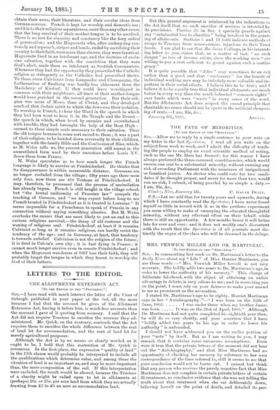LETTERS TO THE EDITOR.
THE ALLOTMENTS EXTENSION ACT. fro THE EDITOR OF TIIE " SPECTATOR."] SIR,—I have read with much interest the letter of the Vicar of Sebergh, published in your paper of the 3rd, all the more because I find that the account he gives of the Allotment Extension Act, having it before him, is much less accurate than the account I gave of it quoting from memory. I said that the Act did not require Trustees to sacrifice the revenue they administered. Mr. Quick, on the contrary, contends that the Act requires them to sacrifice the whole difference between the rent of land let for accommodation, and the rent of land let for merely agricultural purposes.
Although the Act is by no means so clearly worded as it ought to be, I hold that this contention of Mr. Quick is erroneous. In the first place, the expression " quality of land" in the 13th clause would probably be interpreted to include all the qualifications which determine value, and among those the situation of land is as important as, and may be more important than, the mere composition of the soil. If this interpretation were excluded, the result would be absurd, because the Trustees of a charity might be called upon to let in allotments at (perhaps) 20s. or 25s. per acre land from which they are actually drawing from £3 to £5 an acre as accommodation land. But this general argument is reinforced by the indications in the Act itself that no such sacrifice of revenue is intended by its provisions. Proviso (b) in Sec. 4 specially guards against any "substantial loss to charities" being involved in the granting of allotments. Sections 5 and 11 both indicate methods of escape to Trustees from consequences injurious to their Trust funds. I am glad to see that Mr. Jesse Collings, in his interesting letter to you, states that, as a matter of fact, " no such danger" as loss of income exists, since the working men "are willing to pay a rent sufficient to guard against such a contingency."
It is quite possible that "doles " may sometimes be an evil rather than a good, and that " enclosures " for the benefit of individual working men may be infinitely more valuable and important in their social effects. I believe this to be true; and I believe it to be equally true that individual allotments are much better in every way than the much-belauded " common rights" over lands which were " waste in every sense of the word. But the Allotments Act does respect the sound principle that charitable revenues should not be spent in the artificial cheapening of rents.—I am, Sir, &:c.,
January 6th, 1883. ARGY
LL.






































 Previous page
Previous page